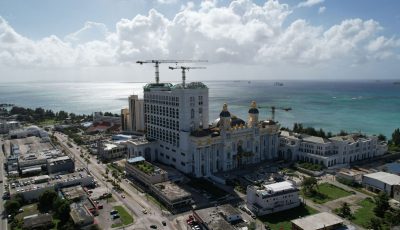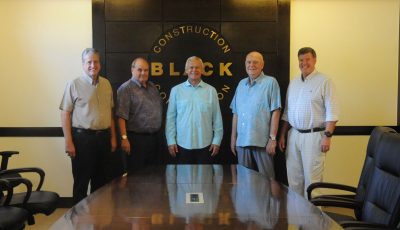Casino regulator: Changes to casino law ‘shifts balance of power’
The House of Representative backed yesterday an amendment to the casino law that casino regulators believe would unacceptably shift their balance of powers to the owners of Saipan’s exclusive licensee, Best Sunshine International, Ltd.
The Commonwealth Casino Commission wrote to lawmakers on Tuesday to urge caution over provisions they deemed “unduly restrictive,” referring to provisions that, among others, mandated how the law would define “casino providers” or “casino employees” in the years to come.
The commission believes these new provisions—introduced via substitute bill on Monday by Rep. Angel Demapan (R-Saipan)—would limit their flexibility to regulate persons or corporations with “direct or indirect” effect on casino gaming on island.
“We must be cautious as some of the new provisions included in Rep. Demapan’s floor amendments quite honestly defeats the very purpose of our existence,” wrote commission chair Juan M. Sablan in a letter to the House on Tuesday.
“The proposed floor amendment limits the commission’s authority unacceptably and transfer the balance of power to the casino,” he added.
The letter was essentially responding to a draft bill that Demapan circulated during floor discussion on Monday. Demapan’s draft—which allowed for tax breaks for Best Sunshine and removed the commission’s power to revoke Best Sunshine’s license—was substituted on Tuesday as it had not been formally introduced on the floor and Demapan cited mistakes in provisions made by staff.
The Tuesday draft did not contain provisions for a qualifying certificate or limits on the commission’s ability to revoke the casino license, but provisions over “casino providers” that appear to halt the commission from regulating affiliated corporations were retained.
Nevertheless, the substitute bills took the commission by surprise on Monday. The commission had been working with the House Committee on Judiciary and Government Operations for months since the original amendment—by Rep. Rafael Demapan (R-Saipan)—was introduced months ago.
Commissioners, staff, and counsel had gathered since last week’s House session to show their support for a bill, House Bill 19-95, that had already been reported out from the House committee on Sept. 18.
They waited in the gallery on Monday, Tuesday, and Wednesday for lawmakers to back a bill that would provide funding for the commission employees past their 90-day contract cycles that will end around October.
“The commission respectfully urges the House to pass H.B. 19-95 as it was reported out of the JGO committee,” wrote Sablan.
On Monday, however, Rep. Angel Demapan circulated a substitute bill during floor session that some in the gallery remarked was a “bill” of Best Sunshine.
On Wednesday, Demapan told lawmakers his substitute bill achieved goals in securing funding for the casino commission’s staff to continue working and executing their duties; and to address the concerns of the commission relative to the provisions of the Open Government Act.
These provisions related to the commission being able to tap into license fees to fund operations, and secondly, allow that confidential private and business information under their purview be exempted from the OGA.
“The amendments I offer also take into account concerns of local businesses like farmers and ranchers, and food and beverage providers who look forward to the potential opportunities of offering their goods to the casino licensee in the hopes of realizing potential positive multiplier effects of what is poised to become the largest economic stimulator of our Commonwealth,” Rep. Angel Demapan said yesterday. “The amendments also take into account the constitutional responsibility of the Legislature to appropriate funds and to enact legislation necessary to structure the affairs of the government and to safeguard the livelihood of our people. The current structure of having the exclusive licensee paying for the operations of their regulator is outright questionable. But now, we have arrived here to formally establish this mechanism as a regulatory fee, albeit still a bit questionable that the licensee funds its regulator.”
On this regulator fee provision, Demapan told lawmakers yesterday that this would give the commission the “authority to set fees as they go and please,” noting that this was “not an investor-induced strategy.”
Problematic provisions
“Public Law 18-56 [the casino law] does have flaws. Nothing is perfect,” said commission vice chair Juan Reyes during public comment in yesterday’s session.
“The bottom line, though, is that when it comes to casino the moral risk is high. …Your commissioners realize all these. Rules and regulations are policies that put a little more teeth into the law because laws are more difficult to amend. We have the integrity of the commission here to preserve.”
“…Get the handcuffs off our hands, let us to do our work,” Reyes went on to say.
In their Tuesday letter, the commission took issue with a section that defines “casino service providers” as “persons.”
“Does this include ‘corporations’ and ‘LLC’?” Sablan writes. “The commission stress that it requires flexibility over licensure of service providers to be able to properly track revenues, and this definition is unduly restrictive. The commission should have the authority to license any service provider with a direct or indirect effect on gaming.”
The commission said they can accept a limitation akin to “any business or group of affiliated business that does more than $50,000 per year business with the licensee” as a limitation via law if the Legislature is worried about their overreach. But, the commission urged that their present regulations are sufficient and the matter could be handled by regulation, not law, and described flexibility in this area as “crucial.”
Minority vs majority
Noting the commission’s concerns, House minority lawmakers urged more time to review Demapan’s bill, asking at one point yesterday afternoon for an hour to go over Demapan’s provisions.
This was was lamented by some majority lawmakers who urged that action be done that day.
After this recess, Rep. Blas Jonathan T. Attao (Ind-Saipan) introduced via subsidiary motion a substitute bill that would essentially move forward with the provisions to fund commission employees and exempt records from the OGA, but also drop Demapan contentious provisions.
Attao noted that they have had three drafts of the bill in a span of three days and would like more time to review the new provisions.
“The substitute bill raises more concerns,” Attao said. “[House Bill 19-95] was a product of the commission. Now with this version, the commission will have concerns… We have been given little time to review a product that the majority took two days to agree upon,” Attao said. The minority bloc got copies of the latest draft yesterday morning.
“…It is an injustice to the legislation,” he said. “There’s more questions and concerns now. Therefore I move for a subsidiary motion to take care of the staff of the commission first.”
After some discussion over other contentious provisions, Attao’s motion was defeated 11-to-9.
Demapan’s bill—or HB 19-95,HD1, HS1—was passed in a roll call of 13 yes votes to seven no votes.



























